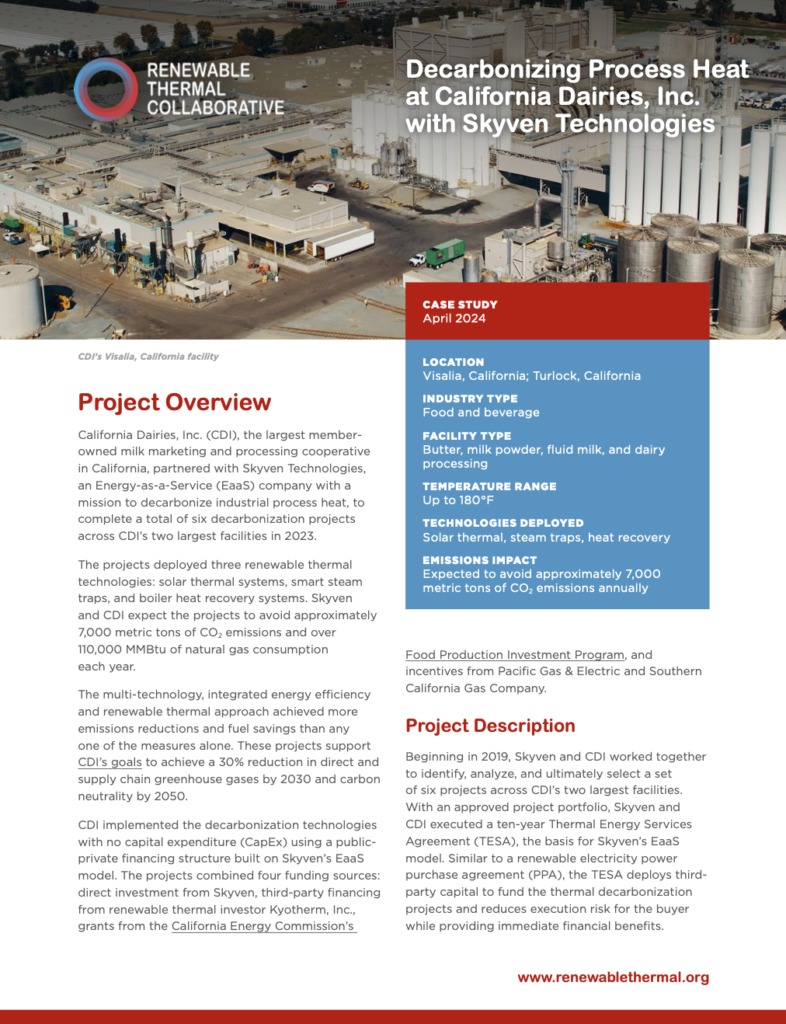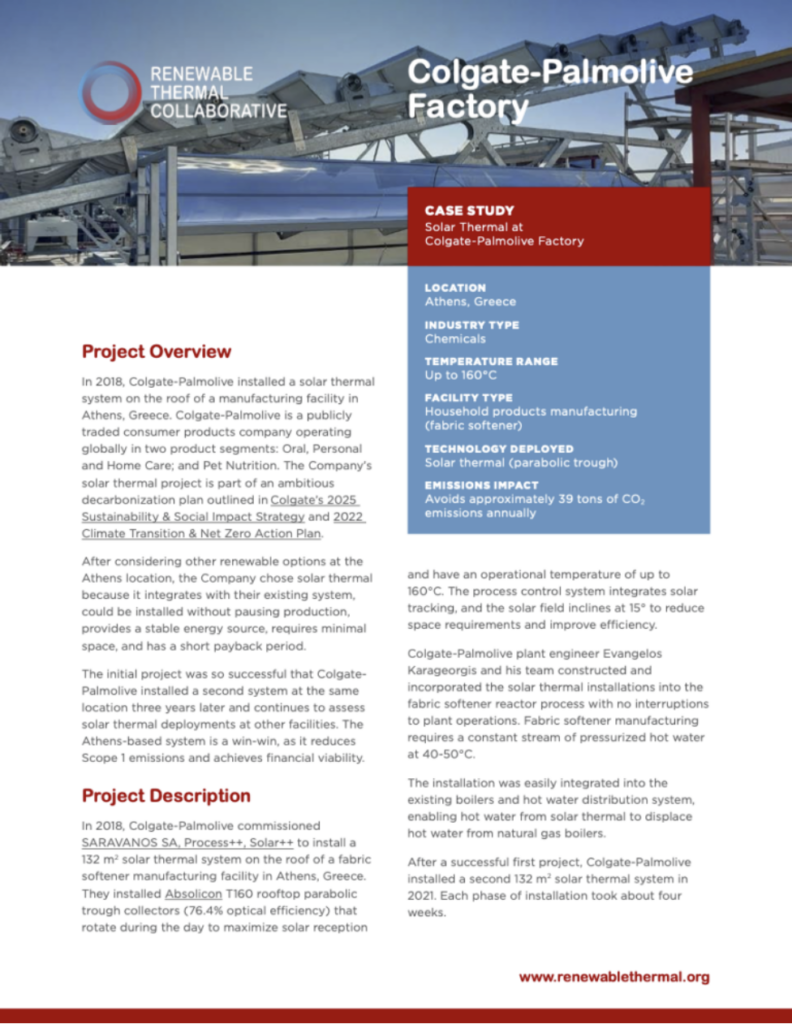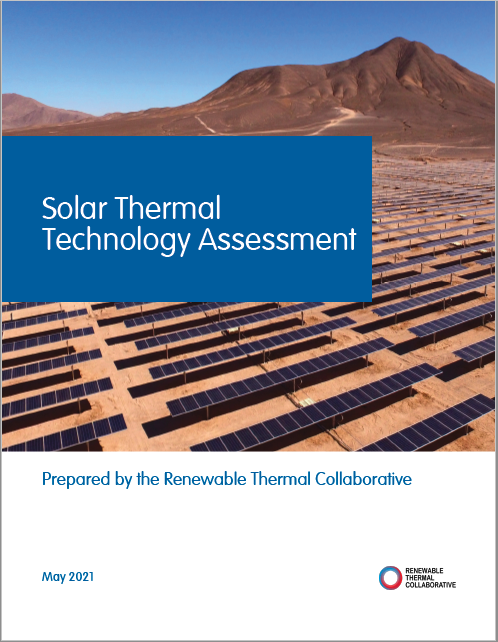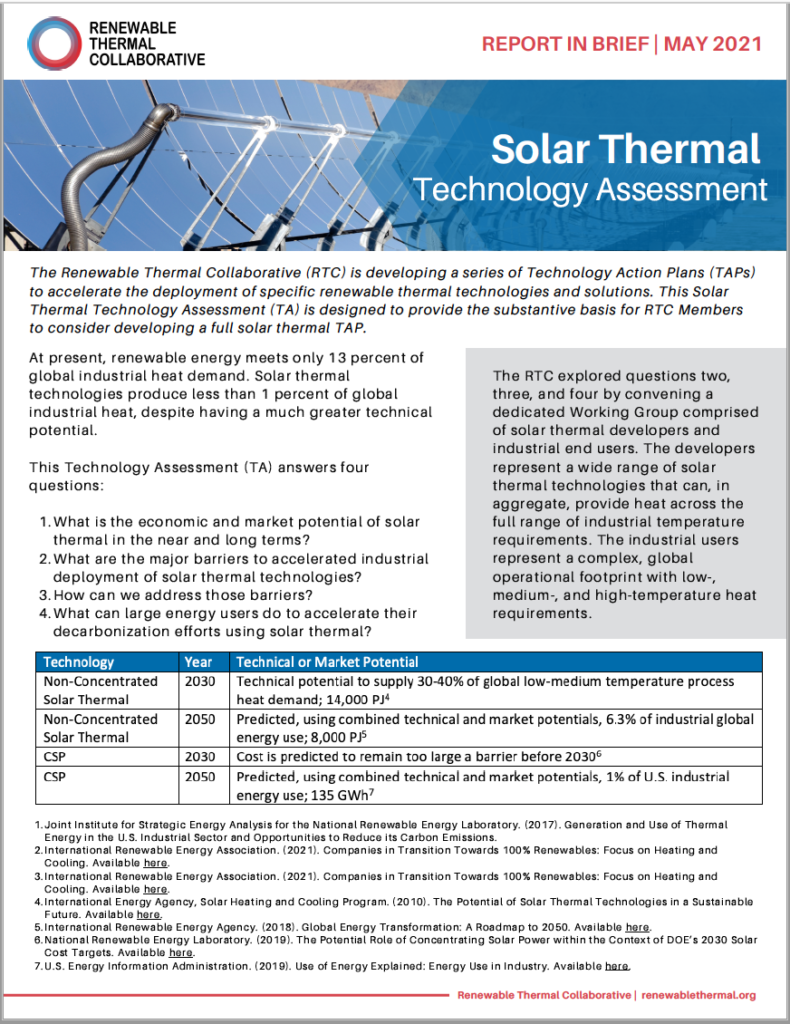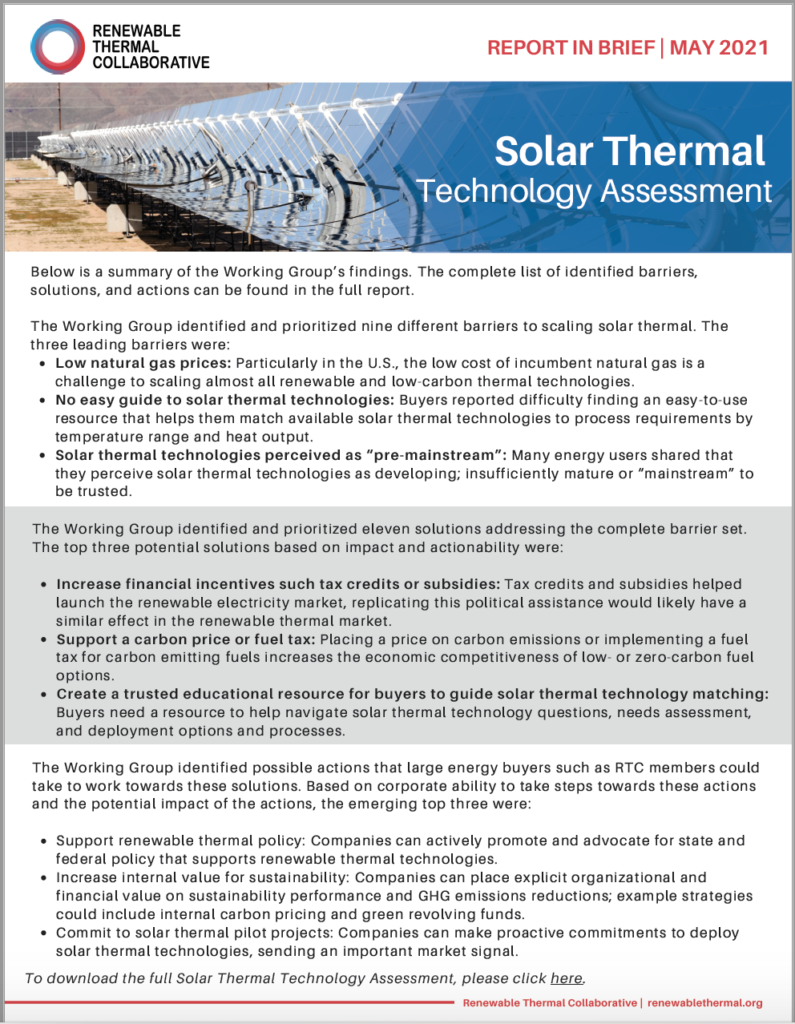Solar Thermal

Solar thermal systems collect and transfer the sun’s thermal energy to provide process heat for industrial applications, hot water, and space heating and cooling.
Solar thermal technologies are generally split into two categories: non-concentrating and concentrating. Non-concentrating technologies, such as flat plate and evacuated tube systems, produce heat up to 100°C. Concentrating technologies, which typically utilize an optical element such as a parabolic trough, concentrate the sun’s energy to much higher temperatures up to 1,000°C. Some solar thermal technologies include integrated photovoltaics and provide both heat and electricity output.
This wide variety of technologies, in aggregate, can provide heat across the full range of industrial temperature requirements. Solar thermal can also integrate effectively with several thermal energy storage (TES) technologies
As the cost of solar thermal systems continue to decline, they are becoming an increasingly attractive part of the industrial decarbonization toolkit.
What is the RTC doing?
In early 2021, the RTC convened solar thermal developers and industrial end users with global operations and varying heat temperature needs to produce a Solar Thermal Technology Assessment. The assessment quantified the technical potential of solar thermal technologies and identified the major barriers to accelerated industrial deployment of those technologies.
To build on this technology assessment, the RTC is launching a solar thermal working group of RTC Members and Solutions Providers and select outside technical experts. The working group will develop, refine, and publish a solar thermal Technology Action Plan and Partnership (TAPP), the RTC’s detailed, multi-year work plan that will identify the policy and market actions the RTC should take to accelerate solar thermal deployment.
Selected materials and webinars
Case Study: Decarbonizing Process Heat at California Dairies, Inc. with Skyven Technologies
Explore how California Dairies, Inc. (CDI), the largest member-owned dairy cooperative in California, partnered with RTC Solutions Provider Skyven Technologies to decarbonize industrial process heat across two major facilities. This case study details the project’s integrated approach to deploying solar thermal technology, smart steam traps, and heat recovery systems expected to avoid a total of 7,000 metric tons of CO2 emissions annually. It explains how CDI implemented the renewable thermal projects with no capital expenditure by utilizing Skyven’s innovative Energy-as-a-Service model and combining direct investment, third-party financing, utility incentives, and state grants. The case study highlights the substantial emissions reductions and cost savings achieved as well as key lessons learned.
Webinar Recording
On May 9, 2024, the RTC hosted a webinar diving deeper into this project, featuring Skyven Technologies' Chris Barnhill. Click the icon to watch the recording.
Case Study: Solar Thermal at Colgate-Palmolive Factory
To advance their decarbonization goals, RTC Member Colgate-Palmolive installed a solar thermal system, built by RTC Solutions Provider Absolicon, on the roof of a home goods manufacturing facility in Athens, Greece. The project shows how renewable thermal installations can be a win for both decarbonization and financial objectives. The system’s installation avoids 39 tons of Scope 1 emissions each year while delivering net cost savings, a short project payback period, and a double-digit rate of return. This case study highlights:
- The project and its outcomes
- Industrial solar thermal technology
- Integration with other technologies such as heat recovery
- Colgate-Palmolive’s decarbonization commitment
- Lessons learned and next steps for interested buyers
Webinar Recording
On May 9, 2024, the RTC hosted a webinar diving deeper into this project, featuring Absolicon's Joakim Byström and Colgate-Palomolive's DJ D'Agostino and Gurpreet Singh. Click the icon to watch the recording.
Solar Thermal Technology Assessment
The Assessment addresses four primary questions:
- What is the potential of both non-concentrating and concentrating solar technology to deliver cost-effective, sustainable, low-carbon thermal energy in the short-term (by 2030) and the long-term (2050)?
- What are the major technical, market, economic, institutional, and policy barriers impeding accelerated development and industrial deployment of solar thermal technologies?
- What priority solutions would ensure that solar thermal technologies are sustainable, cost-competitive (especially relative to natural gas), and scalable?
- What actions could large industrial, corporate, and institutional buyers implement, perhaps in collaboration with others, to help accelerate and scale solar thermal technologies?
Report In Brief
In our factsheet, we provide an overview of our Solar Thermal Technology Assessment, including an introduction to the report and the questions we addressed, the results of the working group, and the current solutions that large energy buyers find the most helpful when it comes to solar thermal development and deployment.
Webinar: Heating Up Decarbonization: Solar Thermal Assessment
As part of our continuing work to help large energy users understand and deploy renewable thermal technologies, the Renewable Thermal Collaborative introduced its new Solar Thermal Technology Assessment.
This assessment explores four primary questions:
- What is the economic and technical potential of solar thermal in the near and long terms?
- What are the major barriers to accelerated industrial deployment of solar thermal technologies?
- How can we address those barriers?
- What can large energy users do to accelerate their decarbonization efforts using solar thermal?

